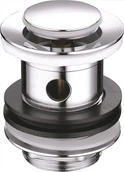Hey there! As a sink drain supplier, I've seen my fair share of problems caused by hard water deposits. It's a common issue that can really mess up your sink drain over time. But don't worry, I'm here to share some tips on how to prevent those pesky hard water deposits from clogging up your sink drain.
First off, let's talk about what hard water is. Hard water contains high levels of minerals like calcium and magnesium. When this water flows through your sink drain, these minerals can build up and form deposits. Over time, these deposits can narrow the pipes, reduce water flow, and even cause clogs.
One of the easiest ways to prevent hard water deposits is to use a water softener. A water softener works by removing the calcium and magnesium ions from the water and replacing them with sodium ions. This makes the water "soft" and less likely to form deposits. If you're dealing with hard water in your area, investing in a water softener can be a game - changer. It'll not only help your sink drain but also other appliances in your home that use water.
Another great way to keep your sink drain free from hard water deposits is to clean it regularly. You don't need to go all out every day, but a simple monthly cleaning routine can do wonders. Start by pouring a solution of equal parts white vinegar and water down the drain. Let it sit for about 30 minutes. The acid in the vinegar helps to dissolve the hard water deposits. After 30 minutes, flush the drain with hot water. This will wash away the dissolved deposits and leave your drain clean.
You can also use a commercial drain cleaner. There are many on the market, but make sure to choose one that's specifically designed to dissolve hard water deposits. Read the instructions carefully before using it, as some drain cleaners can be harsh and may damage your pipes if used incorrectly.


Now, let's talk about the products we offer as a sink drain supplier. We have a wide range of high - quality sink drains and accessories that can help prevent hard water deposits. For example, our Stainless Steel Pop Up Sink Plug is made of durable stainless steel. It's resistant to corrosion, which means it won't be affected by the minerals in hard water as easily as other materials. The pop - up design makes it easy to use and clean, and it can help trap any debris that might contribute to clogs along with hard water deposits.
Our Chrome Pop Up Basin Waste is another great option. The chrome finish not only looks sleek but also provides an extra layer of protection against hard water. It's designed to fit most standard sinks and has a smooth surface that makes it difficult for hard water deposits to stick.
And if you're looking for something a bit different, our 130mm Unslotted Basin Waste is a solid choice. It has a larger diameter, which allows for better water flow. This reduces the chances of hard water deposits building up and causing blockages.
In addition to these products, we also recommend using a drain strainer. A drain strainer is a simple device that sits over the drain opening. It catches hair, food particles, and other debris before they can go down the drain and mix with the hard water deposits. You can easily clean the strainer by removing it and rinsing it under running water.
Another thing to keep in mind is the temperature of the water you use. Hot water can cause the minerals in hard water to precipitate out more quickly, leading to faster build - up of deposits. Try to use lukewarm water as much as possible when doing dishes or washing your hands. This can slow down the formation of hard water deposits in your sink drain.
If you have a garbage disposal in your sink, make sure to use it properly. Don't put large amounts of food waste down the disposal at once. Instead, break it up into smaller pieces. Also, run cold water while using the disposal. Cold water helps to solidify any fats or oils in the food waste, making it easier for them to pass through the drain without contributing to hard water deposits.
Finally, if you notice that your sink drain is starting to slow down or you see signs of hard water deposits, don't ignore it. The earlier you take action, the easier it will be to prevent major problems. You can try the vinegar and water solution or a commercial drain cleaner first. If that doesn't work, it might be time to call a professional plumber.
As a sink drain supplier, we're always here to help you with any questions you might have. Whether you're looking for the right product to prevent hard water deposits or need advice on how to clean your drain, we've got you covered. If you're interested in our products or want to discuss your specific needs, feel free to reach out. We're happy to have a chat and see how we can assist you in keeping your sink drain in top - notch condition.
In conclusion, preventing hard water deposits in your sink drain is all about a combination of regular cleaning, using the right products, and being mindful of your water usage. By following these tips and using our high - quality sink drains and accessories, you can keep your sink drain running smoothly for years to come.
References
- "The Basics of Water Hardness" - A guide on understanding hard water and its effects.
- "Drain Maintenance 101" - An article on how to properly maintain your drains.
- "Choosing the Right Sink Drain" - Information on selecting the best sink drain for your needs.





